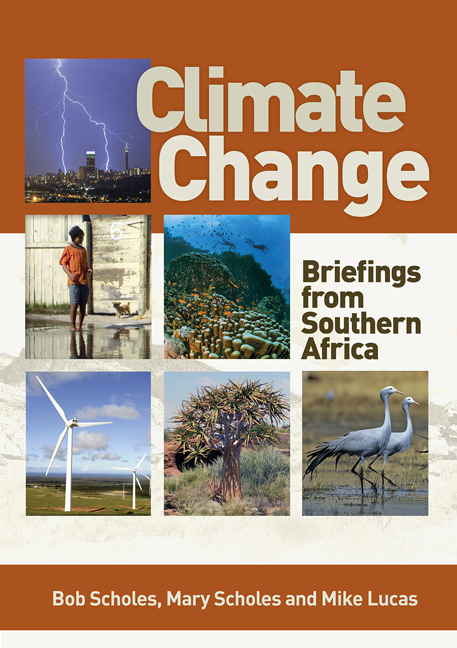Book contents
- Frontmatter
- Acknowledgements
- Contents
- Foreword
- Acronyms and abbreviations
- Preface
- How do governments assess climate change?
- Section 1 Earth system science: The processes that underlie climate change
- Section 2 Consequences of a changing climate for the Southern African environment
- Section 3 Consequences of a changing climate for society
- Section 4 What we can do to avoid and adapt to climate change
- Codicil Is there a dangerous level of climate change?
- Glossary
- List of figures
- References
- Reading list
- Index
How do governments assess climate change?
Published online by Cambridge University Press: 20 April 2018
- Frontmatter
- Acknowledgements
- Contents
- Foreword
- Acronyms and abbreviations
- Preface
- How do governments assess climate change?
- Section 1 Earth system science: The processes that underlie climate change
- Section 2 Consequences of a changing climate for the Southern African environment
- Section 3 Consequences of a changing climate for society
- Section 4 What we can do to avoid and adapt to climate change
- Codicil Is there a dangerous level of climate change?
- Glossary
- List of figures
- References
- Reading list
- Index
Summary
The Intergovernmental Panel on Climate Change (IPCC) is an organization of thousands of scientists, nominated by their governments to evaluate the evidence on climate change. The IPCC assessments provide the most credible source of information on this topic.
The science of climate change is complex and specialized. Thousands of research papers are published on this topic every year, some with apparently contradictory findings. How are policymakers and laypeople expected to sort through this deluge of information? To address this problem, the IPCC was set up in 1988 to summarize climate research at regular intervals. It is tasked with sorting out what is widely agreed to be true, what is likely but remains uncertain, and what is speculative. To do this in an unbiased way, the IPCC is constituted from a very large number of recognized scientific experts from all over the world, and follows a clear and open review process.
The inspiration for the formation of the IPCC was the Assessment of Ozone Depletion, which led to the Montreal Protocol in the 1980s, and is on track to resolve the problem of the ozone hole. The rigorous assessment process by the IPCC has now been applied to several issues, including climate change, that combine high social importance and high technical complexity. Assessments do not dictate what actions to take, which is the responsibility of duly mandated authorities. The assessments set out to sort, organize and evaluate the evidence in such a way that the policy decisions are well informed. Scientists have always subjected themselves to peer review to promote scientific rigour, and assessments play a similar role. The intended audience is professionally knowledgeable, but not assumed to be scientific specialists.
The IPCC provides the interface between science and politics. To be accepted by a wide range of stakeholders as credible and legitimate, it must apply very high standards of impartiality and scientific correctness. It is an independent body set up under the auspices of the World Meteorological Organization (WMO) and the United Nations Environment Programme (UNEP). Representatives of 194 participating governments agree on the scope of the assessment, elect the scientific leaders of the assessment, nominate authors, review the results and approve the summaries written for policymakers. More than a thousand scientists – who are not paid for this service – evaluate the available scientific, technological and socioeconomic information on climate change, and draft the assessment reports.
- Type
- Chapter
- Information
- Climate ChangeBriefings from Southern Africa, pp. xii - xvPublisher: Wits University PressPrint publication year: 2015



